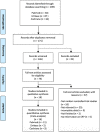Effect of dipeptidyl-peptidase-4 inhibitors on C-reactive protein in patients with type 2 diabetes: a systematic review and meta-analysis
- PMID: 31208420
- PMCID: PMC6580696
- DOI: 10.1186/s12944-019-1086-4
Effect of dipeptidyl-peptidase-4 inhibitors on C-reactive protein in patients with type 2 diabetes: a systematic review and meta-analysis
Abstract
Background: Dipeptidyl peptidase-4 inhibitors (DPP-4i) are emerging glucose-lowering agents through interacting with DPP-4 substrate, impact of which on systemic inflammation in type 2 diabetes mellitus (T2DM) remains unknown. This study aimed to evaluate the effect of DPP-4i on modulating serum levels of C-reactive protein (CRP) in T2DM.
Methods: PubMed, Cochrane library and Embase databases were searched. Randomized controlled trials (RCTs) with comparators were selected. A random-effects model was used for quantitative data analysis. Heterogeneity was evaluated with I2 index. Sensitivity analysis was performed using the one-study remove approach.
Results: Sixteen trials with 1607 patients with T2DM were included. Pooled analysis of DPP-4i demonstrated a significant decrease in serum CRP concentrations (- 0.86 mg/L, 95% CI, - 1.36 to - 0.36). No significant difference was found between DPP-4i and active comparators on serum CRP concentrations (0.64 mg/L, 95% CI, - 0.10 to 1.37). Pooled analysis proved to be stable and credible by sensitivity analysis. In subgroup analysis, changes in serum concentrations of CRP were significantly associated with short diabetes duration (- 0.23 mg/L, 95% CI, - 0.41 to - 0.05).
Conclusions: DDP-4i effectively reduced serum CRP levels and showed no stronger effect than traditional oral antidiabetic agents. International Prospective Register for Systematic Review (PROSPERO) number: CRD42017076838.
Keywords: C-reactive protein; Dipeptidyl peptidase-4 inhibitors; Randomized controlled trials; Type 2 diabetes mellitus.
Conflict of interest statement
The authors declare that they have no competing interests.
Figures





Similar articles
-
Effect of dipeptidyl peptidase-4 inhibitors on tumor necrosis factor alpha levels in patients with type 2 diabetes mellitus.Eur J Med Res. 2024 Jul 12;29(1):363. doi: 10.1186/s40001-024-01955-9. Eur J Med Res. 2024. PMID: 38997754 Free PMC article.
-
Effect of DPP-4i inhibitors on renal function in patients with type 2 diabetes mellitus: a systematic review and meta-analysis of randomized controlled trials.Lipids Health Dis. 2024 May 25;23(1):157. doi: 10.1186/s12944-024-02132-x. Lipids Health Dis. 2024. PMID: 38796440 Free PMC article.
-
Association between dipeptidyl peptidase-4 inhibitors use and leptin in type 2 diabetes mellitus.Diabetol Metab Syndr. 2021 Aug 26;13(1):88. doi: 10.1186/s13098-021-00703-x. Diabetol Metab Syndr. 2021. PMID: 34446063 Free PMC article.
-
The effects of dipeptidyl peptidase-4 inhibitors and glucagon-like peptide 1 receptor agonists on cognitive functions in adults with type 2 diabetes mellitus: a systematic review and meta-analysis.Acta Diabetol. 2020 Oct;57(10):1129-1144. doi: 10.1007/s00592-020-01529-1. Epub 2020 Apr 16. Acta Diabetol. 2020. PMID: 32300876
-
Dipeptidyl peptidase-4 inhibitors alleviate cognitive dysfunction in type 2 diabetes mellitus.Lipids Health Dis. 2023 Dec 11;22(1):219. doi: 10.1186/s12944-023-01985-y. Lipids Health Dis. 2023. PMID: 38082288 Free PMC article.
Cited by
-
The Anti-Inflammatory Effect of Novel Antidiabetic Agents.Life (Basel). 2022 Nov 9;12(11):1829. doi: 10.3390/life12111829. Life (Basel). 2022. PMID: 36362984 Free PMC article. Review.
-
Effect of dipeptidyl peptidase-4 inhibitors on tumor necrosis factor alpha levels in patients with type 2 diabetes mellitus.Eur J Med Res. 2024 Jul 12;29(1):363. doi: 10.1186/s40001-024-01955-9. Eur J Med Res. 2024. PMID: 38997754 Free PMC article.
-
Restoring Brain Pathways Involved in Diabetes-Associated Neurocognitive Disorders: The Potential of Dipeptidyl Peptidase 4 Inhibitors as a Therapeutic Strategy.Curr Neuropharmacol. 2025;23(4):426-438. doi: 10.2174/1570159X22666240517094428. Curr Neuropharmacol. 2025. PMID: 38860903 Free PMC article.
-
Pleiotropic effect of teneligliptin versus glimepiride add-on therapy on hs-CRP and cardiorenal parameters in Indian type 2 diabetes patients: An open-labeled randomized controlled trial.Perspect Clin Res. 2025 Jan-Mar;16(1):14-22. doi: 10.4103/picr.picr_265_23. Epub 2024 Jul 10. Perspect Clin Res. 2025. PMID: 39867519 Free PMC article.
-
DPP4/CD32b/NF-κB Circuit: A Novel Druggable Target for Inhibiting CRP-Driven Diabetic Nephropathy.Mol Ther. 2021 Jan 6;29(1):365-375. doi: 10.1016/j.ymthe.2020.08.017. Epub 2020 Sep 5. Mol Ther. 2021. PMID: 32956626 Free PMC article.
References
-
- Stratton IM, Adler AI, Neil HA, Matthews DR, Manley SE, Cull CA, Hadden D, Turner RC, Holman RR. Association of glycaemia with macrovascular and microvascular complications of type 2 diabetes (UKPDS 35): prospective observational study. BMJ. 2000;321:405–412. doi: 10.1136/bmj.321.7258.405. - DOI - PMC - PubMed
-
- Lee S, Norheim F, Langleite TM, Gulseth HL, Birkeland KI, Drevon CA. Effects of long-term exercise on plasma adipokine levels and inflammation-related gene expression in subcutaneous adipose tissue in sedentary dysglycaemic, overweight men and sedentary normoglycaemic men of healthy weight. Diabetologia. 2019;62:1048–1064. doi: 10.1007/s00125-019-4866-5. - DOI - PubMed
Publication types
MeSH terms
Substances
Grants and funding
LinkOut - more resources
Full Text Sources
Medical
Research Materials
Miscellaneous

